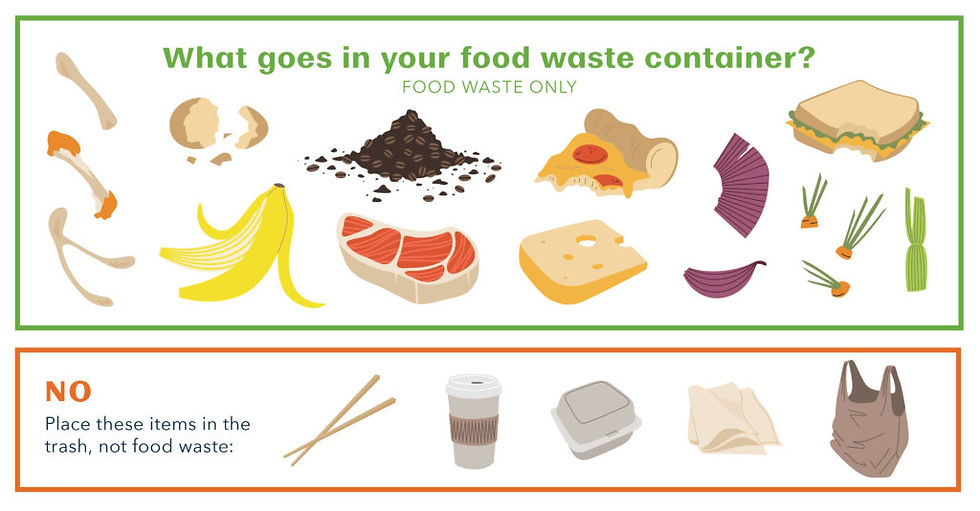New Regulations Involving Food Scraps May Be Including Your Kitchen Soon
- Apr 5, 2023
- 3 min read
Updated: Jan 22, 2024
By Zoe Mackey

WHAT'S HAPPENING?
The City of Portland has initiated a food scraps requirement that is being rolled out to the Portland Metro area over the next 2 years. As of March 2023, large food waste producers will be required to compost their food scraps instead of sending them to a landfill. This will impact around 3,000 businesses - from grocery stores, restaurants and catering businesses, food and beverage manufacturers, and schools/hospitals/campuses with large cafeterias. This project will be rolled out in several phases. By 2025, businesses generating 250 lbs of food scraps or more on a weekly basis will be required to comply with the new regulations. 250 lbs fills about one large curbside rolling garbage bin.)
This policy was implemented as part of a region-wide effort to keep food out of the landfill. As food breaks down, methane gas is produced. Methane is a greenhouse gas, which is a major contributor to climate change. Wasted food scraps are organic materials which can be turned into soil and used for animal feed. Reducing food waste protects Portland's natural resources for future generations.
DOES THIS AFFECT ME?
Overall, this policy is being rolled out in 3 phases. Below is from the City of Portland website:
Business Group 1: Implementation begins March 31, 2022. Compliance by March 31, 2023. Businesses that generate 1,000 pounds or more of food scraps per week (Equivalent to about four 60-gallon roll carts per week).
Business Group 2: Implementation period begins March 31, 2022. Compliance by September 30, 2023. Businesses that generate 500 pounds or more of food scraps per week (Equivalent to about two 60-gallon roll carts per week).
Business Group 3: Implementation period begins September 30, 2023. Compliance by September 30, 2024. Businesses that generate 250 pounds or more of food scraps per week (Equivalent to about one 60-gallon roll cart per week).”
If you are part of business group one, you should have received this letter in the mail. To be clear, this does not include customer waste. It only applies to kitchen waste.
HOW DO I COMPLY?
The city will not be assigning a hauler; you must choose a company and negotiate your contract price. Here is a link to the website that goes over available haulers. Outdoor pick-up bins will be provided by the hauling company. Business owners are responsible for indoor bins/bucket collection. Only collect food products. This includes fruits, vegetables, meat, and animal bones. No liquids are to go in the bin. This includes FOG (fats, oil, grease), unless it’s in solid form. The only paper products allowed are coffee filters and paper bags, and make sure they are not lined with any plastic.

Graphic Source: keeptruckeegreen.org
If you don’t want to use the collection service, you can send scraps to a USDA certified farm. Talk to a representative from the City of Portland for more information on what steps need to be taken.
How the city and county are working together
This is a policy that was enacted from a Metro adopted ordinance that the City of Portland is enforcing. Multnomah County has no role in the enforcement or policy requirements. However, your health inspectors are working to educate restaurant owners on the policy. Inspectors will note whether or not a restaurant is participating. When license renewal letters were sent out at the end of 2022, there should have been a pamphlet regarding this policy enclosed. If you have any questions, please reference the links below.
Overview of the policy: https://www.portland.gov/bps/garbage-recycling/business-garbage-policies/food-scraps-requirement#toc-policy-overview
City of Portland Compliance Guidance: https://www.portland.gov/bps/garbage-recycling/business-recycling/food-service-compost-guide
City of Portland FAQ:
The Original Metro Agreement: https://www.oregonmetro.gov/news/starting-2020-many-businesses-must-keep-food-out-garbage




Comments